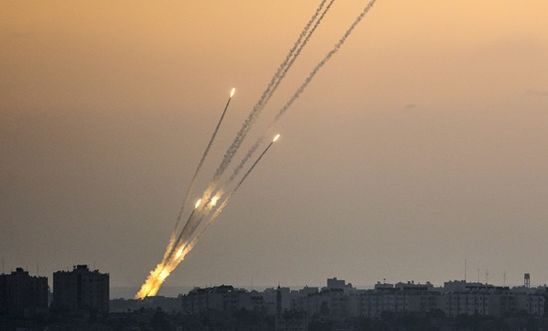Introduction
The ongoing Israel-Palestine conflict has once again entered a perilous phase, with recent events spotlighting a Hamas rocket attack on Israeli targets and the subsequent response by the Israel Defence Forces (IDF). This article seeks to provide an analytical perspective on Israel’s strategic approach in addressing the security threat posed by Hamas.

Hamas Rocket Attack: The Provocation
Hamas, a Palestinian militant group controlling the Gaza Strip, launched a barrage of rockets towards Israeli territory, resulting in casualties and property damage. This provocation, which is not an isolated incident, underscores the relentless challenge Israel faces in safeguarding its civilian population.
Israel’s Right to Self-Defense
Under international law, nations have the inherent right to defend themselves against armed aggression. Israel, like any other sovereign state, is entitled to employ measures necessary to protect its citizens from threats to their safety and well-being.
Precision Strikes: A Deterrent Strategy
In response to the rocket attacks, the IDF executed a series of precision strikes against Hamas targets in the Gaza Strip. Israel’s strategy of employing precise military force is designed to neutralize threats while minimizing collateral damage and civilian casualties. This approach reflects a commitment to adhering to international humanitarian law, even in the midst of conflict.
The Role of Iron Dome
A pivotal factor in Israel’s ability to defend against rocket attacks is the Iron Dome missile defense system. The Iron Dome, developed to intercept and destroy incoming projectiles, plays a crucial role in intercepting rockets and ensuring that they do not reach their intended targets. Its effectiveness has been demonstrated on numerous occasions, mitigating the impact of rocket attacks on Israeli cities.
Balancing Security and Humanitarian Concerns
Amidst the escalation of hostilities, Israel remains acutely aware of the humanitarian implications of its actions. Civilian casualties and suffering are always a grave concern. To mitigate this, Israel has implemented measures such as advance warnings to civilians in targeted areas, thereby giving them the opportunity to evacuate and seek safety.
International Diplomacy and Mediation
Efforts are being made by the international community to de-escalate the situation, emphasizing the urgency of diplomacy and dialogue. International actors are engaging in mediation efforts to promote a ceasefire and create conditions for a lasting peace between Israel and the Palestinian territories.
Conclusion
The recent Hamas rocket attack and Israel’s response have once again placed the Israel-Palestine conflict in the global spotlight. Israel, in its approach, seeks to strike a balance between protecting its citizens from security threats and minimizing the humanitarian toll. The importance of diplomacy and dialogue cannot be overstated in achieving a peaceful resolution to this enduring conflict. As the situation unfolds, it is vital for all stakeholders to work towards de-escalation and the eventual realization of a just and lasting peace in the region.